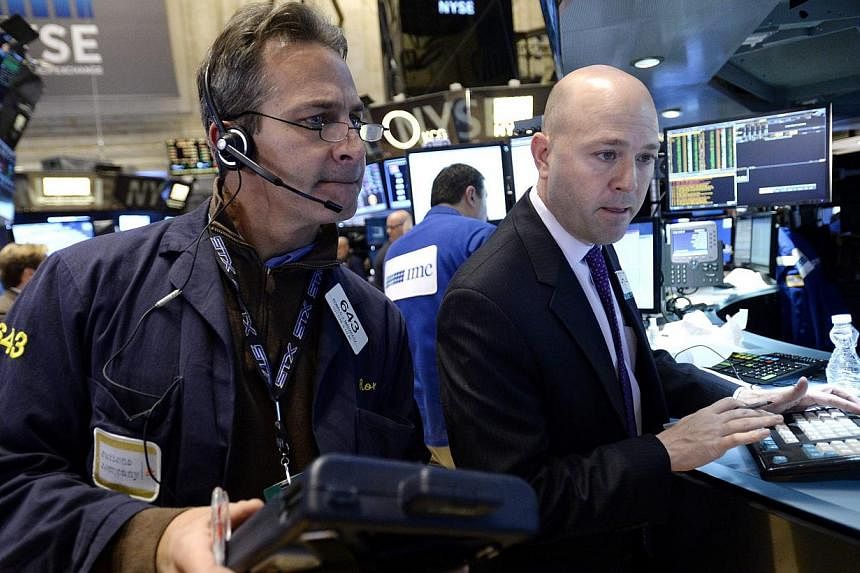NEW YORK (AFP) - The Dow swung more than 100 points all five days this week in a volatile week that ended modestly lower.
In the end, three down days outnumbered the two days of advances, leaving the Dow Jones Industrial Average down by 95.62 points (0.54 per cent) at 17,737.37.
The broad-based S&P 500 shed 13.39 (0.65 per cent) to 2,044.52, while the tech-rich Nasdaq Composite Index fell 22.74 (0.48 per cent) to 2,704.07.
Mr Mace Blicksilver, director of Marblehead Asset Management, called the first full week of trade of 2015 a "roller coaster".
Current conditions resemble the 1990s, "when the US economy was booming, but the world situation was weak", he said.
"There are so many hot spots," he said. "I'm not that optimistic. This might be the year of a correction."
The week's trade again underscored the market's uncertainty at what to make of crashing oil prices.
US stocks surged on Wednesday and Thursday, the only two days when crude rose.
But the fall in US stocks the other three days coincided with lower oil prices, including Monday, when the US crude contract slipped below US$50 a barrel for the first time in more than five years.
"We're somewhat conflicted" on oil, said Mr Jack Ablin, chief investment officer at BMO Private Bank.
Investors welcome how low petrol prices at the pump give consumers more spending power, yet the more than 50 per cent drop in crude in six months is "creating potential disruptions in the capital markets", he said.
Key worries include bad bets on oil by commodities traders, as well as the risk of defaults on bonds held by energy firms.
"Investors focused on the economy and earnings will likely buy stocks," Mr Ablin said. "Investors focused on the oil prices and the implications for the capital markets would be a little more nervous."
WORRIES ABOUT EUROPE
Anxiety about the euro zone also left a cloud over markets this week.
Investors unloaded stocks early in the week on fears that a victory by the left-wing Syriza party in Greece's snap election would lead to a Greek exit from the euro zone.
However, at mid-week, US markets rose with European stocks on greater confidence that the European Central Bank would soon enact monetary stimulus, particularly after euro-zone inflation fell into negative territory, renewing deflation fears.
But on Friday, European stocks tanked again at disappointment over the reported size of potential ECB bond purchases.
Analysts also saw a drag from the terrorist attack in France on Wednesday at satiric magazine Charlie Hebdo that left 12 people dead, the bloodiest attack on French soil in half a century.
"The terrorism in France reminds us how vulnerable we are," Mr Blicksilver said on Friday.
Friday's jobs report gave further evidence that the American economy is outpacing other developed economies.
The US unemployment rate fell 0.2 percentage point to 5.6 per cent in December, while the economy added a solid 252,000 jobs.
Still, analysts expressed worries about weak wage growth. Hourly earnings were up only 1.7 per cent from a year ago, just keeping up with inflation.
Next week's US economic calendar includes the December retail sales report, which is closely watched due to the importance of the holiday shopping season.
Corporate earning season gets under way in earnest with reports from major banks such as JPMorgan Chase and Bank of America.
Other companies reporting financial results include aluminium producer Alcoa and chipmaker Intel.

